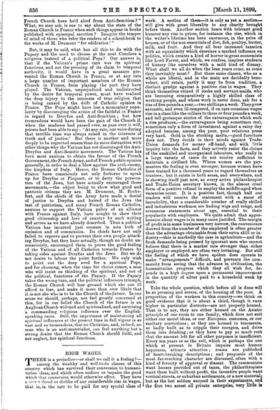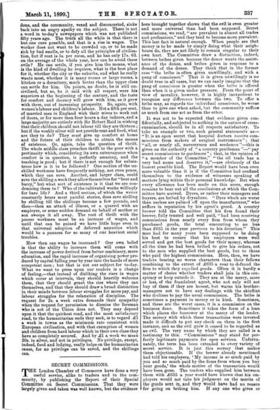HIGH WAGES. T HERE is a prejudice—or shall we call it
a feeling?— among the wealthy and well-to-do classes of this country which has survived their conversion to humani- tarian ideas, and which often undoes or impairs the good which that conversion would otherwise effect. They have a seer-t, dread or dislike of any considerable rise in wages, that is, in the rate to be paid for any special class of work. A section of them—it is only as yet a section— will give with great liberality to any charity brought before them. Another section bears with tolerant good humour any rise in prices, for instance the rise, which in the writer's lifetime has been enormous, in the price of houses, or of the non-essentials of diet, fish, poultry, butter, milk, and fruit. And they all bear increased taxation with an equanimity which exercises a marked influence on politics, which creates a kind of horror in great economists like Lord Farrer, and which, we confess, inspires students of history like ourselves with a mild kind of dismay. What shall we all do when the lean years come, as come they inevitably must ? But these same classes, who as a whole are liberal, and in the main are decidedly bene- volent, still retain, partly it may be from tradition, a distinct grudge against a positive rise in wages. They think themselves ruined if cooks and servant-maids, who are becoming comparatively a highly skilled class of working people, and whose work is never done, ask for a rise of five pounds a year,—two shillings a week. They grow sarcastic, and even ill-tempered, if on rare occasions wages rise in a class like the colliers to three or four pounds a week, and tell grotesque stories of the extravagance which such a rise produces,—the extravagance being sometimes real, sometimes only a form of investment against a rainy day adopted because, among the poor, poor relations press very hard. Gold in the stocking melts,—good furniture does not. They decide in their minds against Trade- Union demands for money off-hand, and with little inquiry into the facts, and they actively resist the claims of the unskilled and unorganised labourers, who really in a large variety of cases do not receive sufficient to maintain a civilised life. Where women are the pay- masters the feeling is even stronger, because women have been trained for a thousand years to regard themselves as trustees ; but it exists in both sexes, and everywhere, and is showing itself just now, as every active philanthropist and Trade-Union secretary knows, in the almost cruel form of a positive refusal to employ the middle-aged when vacancies occur. It is a positive fact, though half our readers will receive the statement with a sneer of incredulity, that a considerable number of really skilled and industrious workmen are finding wigs and rouge, and. erroneous statements about age, essential to their popularity with employers. We quite admit that appre- hension about wages is in many cases justified. The margin of profit is in some businesses very narrow, the convenience derived from the number of the employed is often greater than the advantage obtainable from their extra skill or in- dustry—this is markedly the case in agriculture—and the fresh demands being pressed by ignorant men who cannot believe that there is a market rate stronger than either employer or employed, are often very irritating. But still the feeling of which we have spoken does operate to make "arrangements" difficult, and prevents the com- munity from seeing that the advance in civilisation, the humanitarian progress which they all wish for, de- pends in a high degree upon a permanent improvement in the quantity of silver paid to a household week by week.
Take the whole question, which before all is done will be so pressing and severe, of the housing of the poor. A proportion of the workers in this country—we think on good evidence that it is about a third, though it runs higher in particular districts—are not properly housed. That is to say, they are either housed on the Asiatic principle of one room to one family, which does not suit either our moral ideas, or our European costumes, or our sanitary convictions ; or they are housed in tenements, so badly built as to cripple their energies, and. drive them into drinking ; or they have to pay so much rent that the amount left for all other purposes is insufficient Every ten years or so the evil, which is perhaps the one which at present in Britain impairs most human happiness, attracts attention ; reams are published. of heart-breaking descriptions ; and proposals of the most far-reaching character are discussed, often with a kind of ferocity of approval or dissent. The communists want houses provided out of taxes, the philanthropists want them built without profit, the inventive people want vertical streets, or suburban settlements, or a new material; but as the last seldom succeed in their experiments, and the first two arrest all private enterprise, very little is done, and the community, vexed and disconcerted, sinks back into an angry apathy on the subject. There is not a word in to-day's newspapers which was not published fifty years ago. The truth all the while is that there is but one cure possible, and that is a rise in wages. The worker does not want to be crowded up, or to be made sick by bad smells, or to defy all the principles of civilisa- tion, but if rent is 5s. per room, and he has only 17s. 6d. on the average of the whole year, how can he avoid these evils ? He can settle, if you give him the means, what is the kind of dwelling he requires, what is the best place for it, whether the city or the suburbs, and what he really wants most, whether it is many rooms or large rooms, a kitchen or a dormitory, much better than the upper class can settle for him. On points, no doubt, he is still un- civilised, but so, be it said with all respect, were his superiors at the beginning of the century, and the taste for comfort and decency will grow with him, as it grew with them, out of increasing prosperity. So, again, with women's labour and children's labour. Not a fifth per cent. of married men in England wish their wives to work out of doors, or for more than four hours a day indoors, and a large majority are entirely with Sir Robert Reid in wishing that their children should not labour till they are thirteen ; but if the weekly silver will not provide rent and food, what are they to do? They must give up comfort at home and the future of their children to obtain the means of existence. Or, again, take the question of thrift. The whole middle class preaches thrift to the poor with a pertinacity which, considering its own extravagance when comfort is in question, is perfectly amazing, and the teaching is good ; but if there is not enough for subsis- tence how is it to be followed ? One section of the un- skilled workmen have frequently nothing, not even pence, which they can save. Another, and larger class, could save the shilling a week they allow themselves for "beer and baccy," but what sort of existence is it that we are con- demning them to ? Who of the cultivated works willingly for bare life ? And a third section, of which the writer constantly hears most painful stories, does save shilling by shilling till the shillings become a few pounds, and then—then an attack of illness, or a quarrel with an employer, or some sudden demand on behalf of mother or son sweeps it all away. The root of thrift with the poorer workmen must be an increase of wages, and until that can be gained we have little hope even in that universal adoption of deferred annuities which would be a panacea for so many of our heaviest social troubles.
How then can wages be increased ? Our own belief is that the ability to increase them will come with the increase of power derived from better machinery, more education, and the rapid increase of organising power pro- duced by capital falling year by year into the hands of more competent men ; but that is not our subject for to-day. What we want to press upon our readers is a change of feeling,—that instead of disliking the rises in wages which occur at intervals, they should heartily welcome them, that they should grant the rise where they can themselves, and that they should draw a broad distinction in their minds between labour struggles for more pay, and labour struggles for the relaxation of discipline. The request for 2s. a week extra demands their sympathy when the request for permission to dismiss the foreman who is not of the Union does not. They may depend upon it that the quickest road, and the most satisfactory road, to the humanitarian ends they seek, is to regard .21 a week in towns as the minimum rate consistent with European civilisation, and with that exemption of women and children from hard labour which in their own class they have so completely secured. And by .21 a week we mean 20s. in silver, and not in privileges. No privilege, except, indeed, food and lodging, really helps on the humanitarian cause, for no privilege can be saved, and the shillings can.







































 Previous page
Previous page